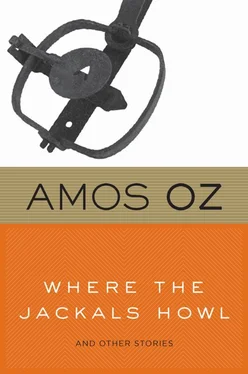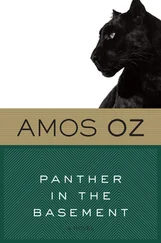Amos Oz - Where the Jackals Howl
Здесь есть возможность читать онлайн «Amos Oz - Where the Jackals Howl» весь текст электронной книги совершенно бесплатно (целиком полную версию без сокращений). В некоторых случаях можно слушать аудио, скачать через торрент в формате fb2 и присутствует краткое содержание. Год выпуска: 2012, Издательство: Houghton Mifflin Harcourt, Жанр: Современная проза, на английском языке. Описание произведения, (предисловие) а так же отзывы посетителей доступны на портале библиотеки ЛибКат.
- Название:Where the Jackals Howl
- Автор:
- Издательство:Houghton Mifflin Harcourt
- Жанр:
- Год:2012
- ISBN:нет данных
- Рейтинг книги:4 / 5. Голосов: 1
-
Избранное:Добавить в избранное
- Отзывы:
-
Ваша оценка:
- 80
- 1
- 2
- 3
- 4
- 5
Where the Jackals Howl: краткое содержание, описание и аннотация
Предлагаем к чтению аннотацию, описание, краткое содержание или предисловие (зависит от того, что написал сам автор книги «Where the Jackals Howl»). Если вы не нашли необходимую информацию о книге — напишите в комментариях, мы постараемся отыскать её.
Where the Jackals Howl — читать онлайн бесплатно полную книгу (весь текст) целиком
Ниже представлен текст книги, разбитый по страницам. Система сохранения места последней прочитанной страницы, позволяет с удобством читать онлайн бесплатно книгу «Where the Jackals Howl», без необходимости каждый раз заново искать на чём Вы остановились. Поставьте закладку, и сможете в любой момент перейти на страницу, на которой закончили чтение.
Интервал:
Закладка:
“Well, well,” said Yosh.
Then the herdsman finished his cigarette and emptied his bladder and turned and went to the little kitchen where Zeshka kept watch at night.
Zeshka, the estranged wife of Dov Sirkin, gave Yosh a drink of warm, sweet milk in an earthenware cup. She was an old, wrinkled woman with sunken eyes like an owl’s. The earthenware cup was large and thick. There was something sharp and nervous in Zeshka’s movements. Her body was stunted, shriveled. Steam rose from the cup, and a film of grease floated on the surface of the milk.
3
EVERY NIGHT, until daybreak, Zeshka sits in the little kitchen where special food is prepared for the babies and the sick children. Her angular face rests on her knees. Her knees are gripped in her arms, like a closed penknife. Every hour she wraps herself up in a long, rough overcoat and goes out to patrol the nursery buildings. She straightens a blanket here, closes a window there, but she does not like this new breed of children, and she feels that there is now no need for children or parents or anything but total quiet.
In between she sits on her bench, not moving, not thinking, as if in the no man’s land on the frontiers of sleep. But she is not asleep. If a child cries in the night or coughs in the distance, she sniffs her way to him and touches him and says:
“Shh. That’s enough, now.”
Or: “That’s enough, now. Quiet.”
And to herself she says:
“So be it.”
Ever since that day, long ago, when Dov Sirkin left his family and his kibbutz, Zeshka has been growing bitter. She speaks ill of the kibbutz and of certain individuals in particular. We do our best to be patient. When her eldest son, Ehud, was killed in a ferocious reprisal raid, we stood by her and guarded her against the threat of insanity. We would come in turns to sit with her in the evening hours. We sent her to a craft training course. And when it occurred to her to demand without shame that we allow her to serve as a regular night watchman, relieving her of all other duties, we did not insist on our principles but said: All right. By all means. You are a special case, and we have decided to grant your request. But please bear in mind… and so on.
If Samson had chosen to die with a wild shriek rather than a groan of resignation, Zeshka would certainly have nodded her head and said, “Right,” or “That’s it.” But Samson chose to die quietly, and Yosh sipped the drink that she prepared for him and left without saying more, without telling one of his stories from the old days. Sometimes he would stay for a while and even tell jokes. Tonight he came, drank, and went out into the darkness.
And then, until the light of morning, the jackals.
Outbursts of weeping, outbursts of laughter, sometimes you would think a child was being burned alive next door. And sometimes it sounds as if lustful men are clinging to a loose woman, pushing her this way and that and scratching and tickling her until she shrieks and laughs and they groan and then even Zeshka smiles and says to herself:
“Yes, that’s right.”
At five or at five-fifteen, when the sky grows pale and a ghostly luster appears on the mountains in the east, long before sunrise, Zeshka goes to her room to sleep. On the way she pauses in the younger members’ quarters, knocks loudly on Geula’s door, and shouts:
“Time to get up. It’s well after five. Good morning. Get up!”
Geula Sirkin, the surviving child of Zeshka and Dov, wakes up in hatred and rises to wash her face under the cold-water faucet. She runs to the dining hall, and if anyone says, “Good morning, Geula,” she may reply wearily, drowsily, “Fine. All right.” When she gets to the kitchen she switches on the big urns and makes coffee for the workers. Her nails are cracked, her hands rough and scabby, and there are two bitter creases at the corners of her mouth. Her legs are thin and pale and covered with a down of black hairs. That is why she always wears trousers, never a skirt or a dress. And although she is now more than twenty years old, there are still adolescent pimples on her cheeks. She is also in the habit of reading modern poetry.
Coffee in big urns, thinks Geula, is revolting stuff. You make proper coffee in an Arabic coffeepot. Ehud did not come home on leave often, but every visit had been a delight to the unmarried girls. And sometimes to the married girls as well. He used to prepare coffee like a primeval wizard, with spells and whispered incantations. And he would laugh suddenly as if to say: What do you know, and what could you know, about the terrors of bazooka fire at close range? But he was a man of few words. He just burst out laughing and asked why they were all hanging around him, as if they had no homes to go to, as if they had nothing to do. And long before he died, his eyes were full of death. He did not leave the kibbutz, but he did not live there, either: his army service was extended from year to year, and he became a legendary figure in the army and in the border settlements; he was twenty-three years old and they gave him command of a battalion. He roamed the land in a tattered uniform and sandals, with a submachine gun plundered from the corpse of a Syrian. He took part in all the reprisal raids — he did not miss a single one. Once he set out, while suffering from a severe case of pneumonia, and blew up the police station in Bet Ajar. It was he who caught, singlehanded, in a night expedition to Mount Hebron, Isa Tubasi, the murderer of the Yaniv family from the moshav of Bet Hadas. When he returned from his solitary mission to Mount Hebron he said to his sister, Geula, “I killed him and six others as well. I had to.”
As the coffee urns begin to steam and Geula smokes her first cigarette of the day on an empty stomach, the jackals of the valley disperse to their hiding places. The smell of Samson’s blood has disturbed their night. The jackals of the valley are feeble creatures, dripping saliva, mad-eyed. They have diffident paws and quivering tails. Sometimes one of them goes mad with hunger or jubilation and breaks into the farmyard and starts biting until the watchmen shoot him. And his comrades laugh maliciously amid their bitter whining.
At one time, many years ago, Dov Sirkin would lay poisoned bait for these jackals, also little gin traps that he himself had designed and constructed. He laughs longest who laughs last, Dov Sirkin used to say. Later he got up and left the kibbutz and his family and went out to roam the land. To his wife he said, “A man must try to leave some fingerprints that will remain after he is dead; otherwise there is no point in being born at all.”
According to the orders of the general staff, our soldiers are forbidden to withdraw from enemy territory until all the wounded and the dead have been evacuated. How was it that Ehud’s corpse was left in no man’s land? Two commissions of inquiry had investigated this disgraceful episode and lessons had been learned. For three nights Ehud lay in no man’s land. The enemy soldiers tried to retrieve the body so they could display it in one of their cities and thus soften the humiliation of their defeat in this and other battles. Crazed with anger and shame, Ehud’s comrades thwarted the enemy’s purpose with a heavy, continuous stream of fire from our frontier. The enemy forces also covered the dead man and would not let his comrades retrieve him. Night after night Ehud’s comrades risked their lives, crawling into that godforsaken patch of ground, riddled with bushes and mines, but they were driven back again and again. The enemy set up powerful searchlights and scattered the darkness. On the fourth night, and at the cost of six casualties, Ehud’s comrades succeeded in recovering him — in spite of all the dangers, and although they had been ordered to abandon the attempt. They brought him to the camp, and from there to his home, and they said to him: Ehud, our friend, you would not have deserted us even to save your life, and we have not deserted you. Rest in peace.
Читать дальшеИнтервал:
Закладка:
Похожие книги на «Where the Jackals Howl»
Представляем Вашему вниманию похожие книги на «Where the Jackals Howl» списком для выбора. Мы отобрали схожую по названию и смыслу литературу в надежде предоставить читателям больше вариантов отыскать новые, интересные, ещё непрочитанные произведения.
Обсуждение, отзывы о книге «Where the Jackals Howl» и просто собственные мнения читателей. Оставьте ваши комментарии, напишите, что Вы думаете о произведении, его смысле или главных героях. Укажите что конкретно понравилось, а что нет, и почему Вы так считаете.












